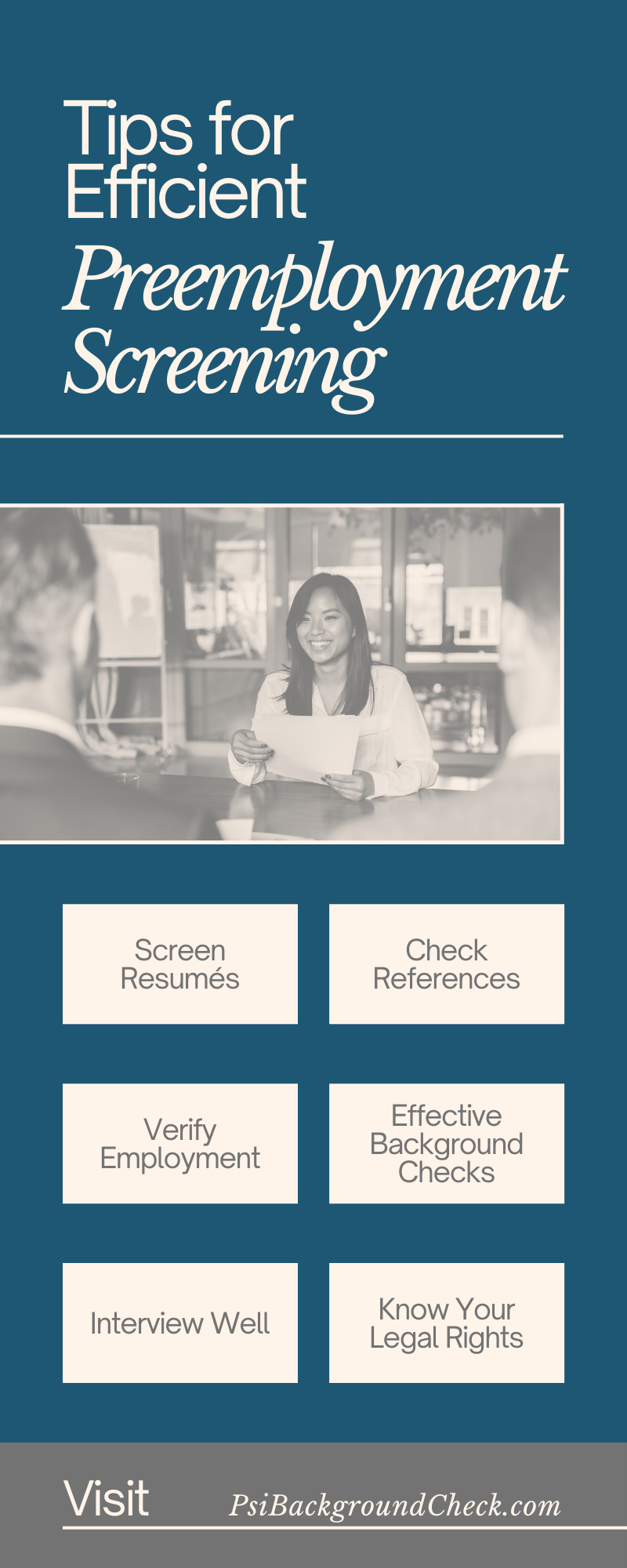Tips for Efficient Preemployment Screening
PSI Team | Uncategorized
When your company is attempting to fill a position, you’ll probably get a lot of applications. However, sorting through them and narrowing applicants down to the ones you may want to hire can take a long time. One way in which a lot of larger companies sort through applications is with preemployment screenings, which check potential hires against the company’s requirements. Implementing a similar system in your hiring process can speed up the process and quickly weed out bad hires. Learn some tips for efficient preemployment screening here so that your screening process is the best it can be.
Screen Resumés
The first and most obvious thing you can do to screen potential employees is require resumés when they apply. These documents should list what the applicants consider their best qualifications and skills, giving you insight into whether or not they fit the position. Resumés are short and therefore don’t give a full picture, but they do tell you if an applicant fits the basic requirements for the position and help you narrow down the list of potential hires.
Check References
Checking the references that an applicant provides on their resumé can tell you a lot about them. A wide range of quality references is a great sign of a good worker, but references that all come from the same group may show a lack of versatility. You should trust your gut feeling on whether or not someone’s refences are trustworthy. There are legal limitations on what you can ask a reference, depending on local and federal laws, so be careful when you call up references so as not to cross any major lines.
Verify Employment
Once you’ve narrowed down the applicant pool to people who may fit your company’s requirements, you should start verifying their previous employment. Although you shouldn’t expect it, some potential hires may lie and falsify their previous employment. Catching these lies before you make a hire will avoid a lot of issues in the future.
However, running employment verification can take a lot of time and legal knowledge. Using a third-party employment verification service can allow you to check verification quickly and save you resources.
Conduct Effective Background Checks
Alongside employment verification should come a background check for any potential hire. A good background check will give you all sorts of information that can help you choose between applicants. You might not need to run extensive background checks, but they can be helpful by allowing you to get the whole picture. Things such as education history can come up on background checks, which you can compare to resumés to spot any liars.
A background check won’t give you the full context, so you shouldn’t disqualify anyone just because of a small blip on the background check. You can ask potential hires about things on their background checks and see if they have reasonable explanations before you throw away their applications. That way, you won’t lose a potentially great hire to a misunderstanding.
Interview Well
The next tool you should use for efficient screening is the interview. Most companies conduct one-on-one interviews, though larger group interviews are becoming more popular. These interviews are the perfect times to learn more about any potential hires and properly meet them for the first time. Ask tough questions so that you can learn how they really feel about the job and how they think they qualify.
The real purpose of an interview is to allow you to determine whether this person would fit with your company. Interviews usually come down to trusting your gut on whether a person would fit well in your company.
Know Your Legal Rights
A lot of these checks and verifications have a variety of complex laws in place for the protection of workers and employers. There are certain things you can and can’t ask for on a resumé or a background check. These laws can get very complex, and local and state laws change things, too. That’s why it’s best to leave these services to professionals—you don’t want potential hires suing you for breaching laws. You also need to be cautious in interviews, as there’s a lot of topics you can’t ask about because of important antidiscrimination laws. The best practice is hiring a human resources professional who knows these laws and who will help you navigate background checks and interviews.
Conduct Assessments
Some jobs require specific skills for proper performance, which is where skills assessments come into play. Businesses can ask potential employees to take tests for specific skills that are necessary for the job. For example, a financial position may require a test in math and financial laws. There are some legal requirements for these tests to prevent discrimination, but they can be extremely useful for screening applicants to find the person who can really help your company.
Assess Soft Skills
These are the hard-to-quantify skills that can make for the best employees, such as communication and collaboration. Even the ability to take criticism is important for a good worker. However, measuring these skills can be difficult. There are questions you can ask in an interview to test an applicant’s soft skills, and certain previous jobs might have helped them develop these skills as well. Sometimes you can run assessments that test soft skills, but more often than not, you’ll just have to trust your ability to read people.
Take Internal Applications and Recommendations
One way to really narrow down your applicant pool is to focus on internal hiring and recommendations. Looking internally for potential promotions can raise company morale and incentivize employees to perform well. If that’s not a possibility, asking employees to recommend potential hires can greatly improve the quality of applicants, as only your workers really know who’d fit into your company. Plus, hiring people who already have ties to and bonds within the company can improve company culture and employee retention.
Following these tips for efficient preemployment screening can greatly improve your company’s hiring process. That’s why so many larger corporations already use these practices.
